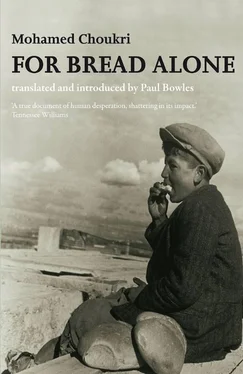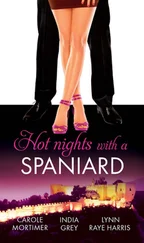I wonder why they didn’t put BouChta in here with us, I said.
They just didn’t happen to. I don’t think there’s any reason. They’ll let him out too on Monday or Tuesday.
You think they’re going to let BouChta and me off that easily?
You’ll see, he said.
And Naima and Faouziya? I said after a moment.
They’ll be out drinking and whoring again on Monday or Tuesday. The worst that can happen to them is that they might make them go into a whorehouse to work, where they can give them a medical examination every week. Anyway, I think BouChta and Faouziya will be getting married as soon as they get out of here.
You mean he’s in love with her?
I don’t know. But he wants to live with her.
And you?
What do you mean, and me?
I mean you and Naima, I said.
He put his forefinger to his temple and drew circles with it. Are you out of your mind? She’s like every other whore I ever knew. I didn’t come into this world to marry a whore.
I heard the sound of footsteps close by, outside the door. We all turned in that direction. The little square window in the middle of the door opened. Then the door swung inward rapidly, making a great noise.
They do it that way to scare us, I thought. Even the way they open the door is part of the punishment.
Two old men came in, one of them carrying a large tea-kettle and a basket full of metal mugs to drink out of, and the other a white canvas sack. They said good morning. Behind them in the corridor stood two guards. They gave each of us a loaf of bread and a mug of tea.
You’ve got fifteen minutes before they take out the mugs, said one of the guards.
The two old men went out and the guards shut the door. The little window remained open. Both the tea and the bread were hot. We ate and drank without speaking.
Leave half your bread for the afternoon, Zailachi advised me. They won’t bring anything around again until this time tomorrow.
I nodded my head. After we had finished, Zailachi pulled out a cigarette and passed it to the others. He and I shared a second cigarette between us. I noticed that the two youths who had been arrested in the Café Debbou left none of their bread for later. The third one, like Zailachi and me, saved the greater part of his. Always when I have drunk and smoked a great deal, the following day thirst takes the place of appetite.
We continued to smoke in silence, sipping what was left of the tea. My body had begun to glow with warmth. The little window stayed open. It may be because of the window that we remain so quiet. What would life be like, I wondered, if all of it had to be spent sitting like this here in this room? We would all have to exist only in our memories, acting out the parts we play here until we were so bored by both them and the memories that we came to rest in a silence like this one. We would disappear one by one, until all of us were gone, and the unluckiest of us would be the one who disappeared last. I prefer to be with people, even though they may be my enemies. I would rather be shut up in a place like this with others than be free and solitary. It would be better to be the first rather than the last to disappear.
The door opened, and the old man who had brought the tea came in. A guard stood behind him watching us. We finished off the last drops quickly, and dropped the mugs into the old man’s basket, on top of those that were already there, and we thanked him.
May Allah forgive you and us both, he said.
Some of us answered: Amin .
The guard slammed shut both the little window and the door. The violent sounds were no longer producing their effect. I had become indifferent to them. With time I should not even notice them, and perhaps not even notice the fact that I was shut into a room. But I am still not used to solitude.
Zailachi took out a small pencil and set to work writing on the wall.
What are you writing? I asked him.
I’m writing two lines of a poem by Abou el Qacem Chabbi. He was from Tunis.
And what did he say?
Here’s what he says:
If some day the people decide to live, fate must bend to that desire
There will be no more night when the chains have broken .
Do you understand?
No, but it’s magnificent. What does it mean?
He’s talking about the desire to live.
And what does the desire to live mean?
It means that if a man or a country is enslaved and decides to try and get free, Allah will help. He says: the dawn will respond and the chains will break because men will make it happen.
I see.
Abou el Qacem Chabbi was a great poet, he said. The others were listening attentively.
You’re lucky, I said to Zailachi.
Lucky? Me? He was surprised.
Yes. You’re lucky.
Why?
Because you know how to read and write.
So I can read and write, he said. What good is it? Here I am in this room. Who knows what they’re going to accuse me of? Things I’ve done? Things I haven’t done?
He began again to write on the wall, asking me at the same time as he formed the first letter: What’s this?
I don’t know.
It’s alif , he said. Then he made another letter. And this?
I don’t know. What is it?
That’s ba . And this?
Tsa , I said.
How do you happen to know that one?
Because I’ve always heard people say: alif, el ba, et tsa . And I repeated with him the reading of the three letters.
We can make words out of these three letters, like aboun, baboun, bata, taba .
He stepped away from the wall. Some day I’ll teach you to read and write, he said. You could learn easily.
Do you think it’s easy?
Why not? Aren’t you a man?
I asked him to repeat the verses by the Tunisian poet several times, until I had learned them by heart.
During the afternoon the young man who had been asleep the night before began to pace restlessly, from one end of the room to the other. The rest of us sat quietly, watching him. At one point he seized the piece of bread he had saved from the morning, walked over to the latrine, and crumbled it in his hands, dropping the pieces down the hole. I looked at Zailachi.
It’s his business, he whispered. Let him do what he likes with the bread.
The other two glared angrily at the youth. It seemed to me that if he made one more move, there might easily be a fight.
Why’d you throw the bread down the hole? one of them demanded.
I can do what I want with my bread, he said, glowering.
But you threw away bread, en neama d’Allah!
I tell you I’m free! the other cried.
You’re a pile of shit!
I’m free to do as I like with my bread, and with myself, too!
Yes, but do it when you’re alone.
Suddenly the young man began to pound the wall with his fists, and soon he was butting it with his head. After a few blows he slid to the floor unconscious, his hands and forehead running with blood. Zailachi rose and knocked loudly on the door. The little window opened and a guard said: What is it?
Somebody hurt himself, Zailachi said. He came back and sat down. That’s all we can do, he whispered.
The young man who had been objecting now said: That’s what he gets for doing what he did.
The door opened and two secret policemen entered, accompanied by the uniformed guard. What’s going on in here?
He crumbled up his bread and threw it down the latrine, Zailachi said. And then he started to hit the wall.
And before that, what happened? asked the other secret policeman.
Nothing.
You didn’t quarrel first?
Zailachi looked around at all of us.
No, he said. Ask him when he comes to.
One of the policemen walked over and examined the blood stains on the wall. We’ll see later whether there wasn’t some sort of trouble here before he began to hit himself, he said.
Читать дальше












